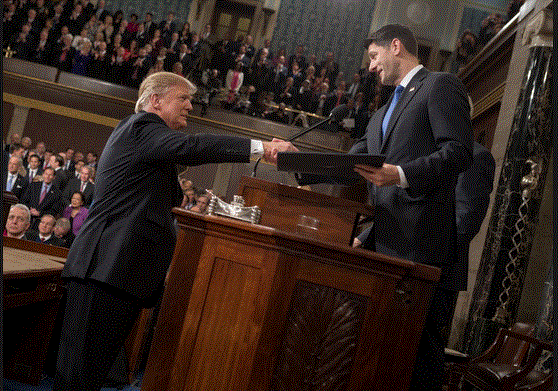
Credit: Wikimedia Commons
The Republican Party’s effort to repeal Obamacare was like a play taken on the road for tryouts for seven years and then, when brought to Broadway, closes on opening night. There are some important lessons from the GOP’s shambolic failure.
First, as political scientist Richard Pildes writes, the collapse of repeal and replace is no one-off; there are structural problems that will continue to bedevil the Republicans. Professor Pildes sees two kinds of political fragmentation bedeviling the party. First, power in Congress has moved from leadership to individual members. Second, power has shifted from the parties to outside actors. Consider those recalcitrant congressmen, who might once have been restrained by the party’s role in funding them, but received assurances from the Koch Brothers that Koch would step into the money breach. Members also have more capacity to raise money from small donors. Committee assignments now seem to matter less than in the past. Leadership can no longer cajole members with earmarks, which the GOP banned several years ago. Corralling votes ain’t what it used to be.
Professor Sarah Binder also focuses on Congress and points to three lessons. First, political and policy differences embedded in the House Republican Congress complicate efforts to get to Yes. Second, rules matter and the need to pass the bill in the Senate through the reconciliation process hamstrung the House. Freedom Caucus members insisted on changes that would have killed the bill in the Senate, and at-risk members in the House were reluctant to stick their necks out for a loser. Third, members of Congress focus like a laser on their own re-election. The ever shifting House plan reached toxic levels of unpopularity. Ninety percent of Republicans in the House outpolled Trump in their own districts, so they didn’t get in on his coat tails and didn’t fear retaliation from him. Trump’s dwindling political capital is a challenge as the House turns to tax reform.
Professor Andrew Rudalevige also points to reconciliation and the weakness of the parties. With repeal on the agenda the president’s lack of knowledge about health care and the details of the bill hurt. Rudalevige also notes Professor Richard Neustadt’s formula for presidential influence: the reputation for “skill and will,” public prestige, and formal powers. Trump had little to offer here. His inability to be specific on healthcare left congressmen wondering what he was about, and if he would stick with it. His public prestige is historically low. And he had few formal powers to bring to bear. In essence, he’s a weak president.
We don’t like having things we’ve come to rely upon taken away from us. That underlies the core findings of the research of Professor Paul Pierson, who finds that it is extremely difficult to take away government programs once people get accustomed to them. Taxpayers may have some annoyance at any given program among all they pay for, but recipients care passionately about the programs that benefit them. Taking health care away from 24 million Americans was a tough sell.
Matt O’Brien of the Washington Post offers a credible reason for trying to pass the repeal so quickly. What the GOP really cares about is tax cuts, and they needed the repeal of health care to provide apparent savings they’d need to do a tax bill. The “GOP didn’t want to let a detail like tens of millions of people losing their health insurance get in the way of two tax cuts for the rich.”
Even though the Republican Party has become extremely ideological (thanks to free marketers like the Koch Brothers and other dark money funders), it isn’t a monolith. The party’s candidate recruiters including Ryan made promises that once the new guard gets to Washington, compromise is out and a new day of ideological purity shall reign. Those candidates, as Norman Ornstein points out, actually believed that garbage. They are congressmen now.

